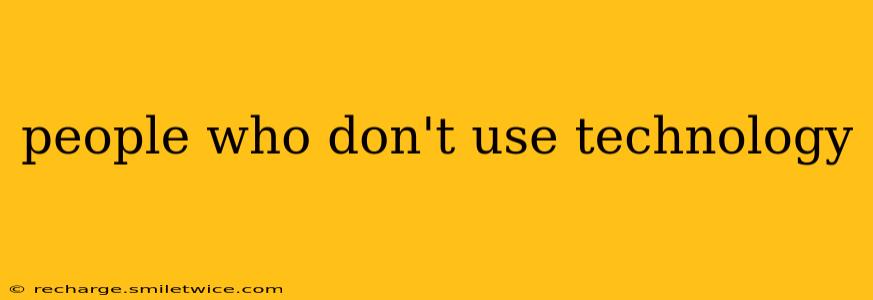People Who Don't Use Technology: Understanding the Unplugged Life in a Digital World
In today's hyper-connected world, it's easy to assume everyone is glued to a screen. However, a significant portion of the population actively chooses, or due to circumstances, finds themselves less engaged with technology than the average person. Understanding this group, their reasons, and their experiences is crucial in navigating an increasingly digital society. This exploration delves into the lives of those who don't use technology extensively, addressing common questions and misconceptions.
Why Don't Some People Use Technology?
This isn't a monolithic group; reasons for limited tech engagement are diverse. Some individuals might actively choose a simpler life, prioritizing face-to-face interactions and tangible experiences over digital ones. This choice often stems from philosophical beliefs about the impact of technology on mental health, relationships, and society at large. Others may face barriers to access, including financial constraints, lack of digital literacy, or physical limitations that prevent comfortable use of devices. Age is another important factor; older generations may not have grown up with technology and thus lack the comfort level or familiarity with its usage.
What are the challenges faced by people who don't use technology?
Navigating a world increasingly reliant on technology presents unique challenges for those who don't use it extensively. Simple tasks, such as booking appointments, paying bills, or accessing essential services, can become significantly more difficult. Social isolation is another concern, as digital communication has become the primary mode of interaction for many. Exclusion from online communities and social networks can lead to feelings of loneliness and disconnect. Furthermore, accessing information and news becomes more challenging, potentially limiting their understanding of current events and societal developments.
How do people who don't use technology manage their daily lives?
Those who limit their technology use often rely on traditional methods to manage daily life. This may involve using physical calendars and planners, making phone calls instead of sending emails or texts, and relying on in-person interactions for communication and transactions. Many find creative solutions, building strong support networks within their communities to assist with tasks requiring technological proficiency. This highlights the importance of strong community bonds and mutual support systems.
Are there any benefits to not using technology?
While challenges exist, limiting technology use can also offer significant benefits. Many individuals report improved focus, reduced stress levels, and increased time for personal pursuits, hobbies, and meaningful relationships. A decrease in screen time often correlates with enhanced physical activity and a greater appreciation for the natural world. The intentional disengagement from the constant stream of digital information can foster a greater sense of presence and mindfulness.
What is the future for people who don't use technology?
As technology continues to advance and integrate into various aspects of life, it's crucial to ensure inclusivity for those who choose or are unable to fully participate. Efforts should focus on bridging the digital divide through improved accessibility, digital literacy programs, and initiatives that support alternative methods of accessing essential services. Creating a society that caters to diverse levels of technological engagement ensures that no one is left behind.
This exploration aimed to provide a nuanced understanding of individuals who don't extensively use technology. It's not about judging their choices but rather recognizing the complexities of their lives within a rapidly evolving digital landscape. The future necessitates a balanced approach, leveraging technology's advantages while ensuring equal access and opportunity for everyone, regardless of their relationship with technology.
